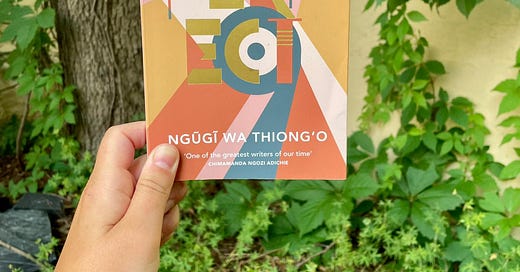Welcome back to Bookmarked, a weekly newsletter following my journey as I read one book from every country. If you’re a new reader who joined over the summer break, welcome! If you like the sound of my project, I’d love it if you shared Bookmarked with a friend.
Earlier this year The Perfect Nine by Kenyan writer Ngũgĩ was Thiong’o became the first book written in an indigenous African language to receive a nomination for the International Booker Prize. Written in the Bantu language Gĩkũyũ and told in flowing verse narration, the book is a retelling of the Gĩkũyũ origin story, in which the ten daughters of Gĩkũyũ and Mũmbi become the founders and matriarchs of the Gĩkũyũ clans.
The story begins with Gĩkũyũ and Mũmbi—the first man and woman—settling at the base of Mount Kenya, where they have ten daughters: Wanjirũ, Wambũi, Wanjikũ, Wangũi, Wangeci, Waceera, Mwĩthaga, Wairimũ, Waithiegeni, and Wamũyũ, their youngest daughter who is born unable to walk. Gĩkũyũ and Mũmbi raise their daughters, who are all dazzlingly beautiful, to be entirely self-sufficient, teaching them to do everything from building houses to making weapons and protecting themselves from danger.
When they’re old enough, Gĩkũyũ asks God to provide suitable husbands for his daughters. Immediately God delivers ninety-nine men who promptly set about competing for the sisters’ hands in marriage. In turn, the sisters compete against them and, to the men’s annoyance, beat them at pretty much everything. They find it especially difficult to accept that Wamũyũ, the sister who cannot walk, is better than all of them at shooting.
They claimed the women were the real root of all their problems,
That we had lured them from their homes by dreams wrought by charms,
The proof of our witchery being our actions and deeds, like
Our being able to endure and do things just like the men.
Facing danger without complaint showed that we were witches.
A few even cited Warigia’s ways with arrows as more evidence of witchery:
Otherwise, how could a crawling cripple beat men, fully fit, in archery?
How else could a cripple shoot arrows a distance no man could reach?
That was pure witchery; even our beauty was an illusion wrought by sorcery.
One by one, the men drop out, lose, and even die. Ultimately those who survive are tasked with accompanying the oldest nine sisters on a journey to find an ogre king who may possess a cure to Wamũyũ’s disability. It is this journey which makes up the majority of the book, as the sisters and their suitors face countless challenges, conquering fear and doubt as they learn to respect one another and work together.
As it was now our tradition, there was no saying this is men’s work or women’s work.
We did tasks according to ability and necessity and inclination.
Thiong’o, who is based in California and previously spent time in exile after he was jailed in post-colonial Kenya for writing a play in Gĩkũyũ rather than English, is an exceptional storyteller. Combining Homeric verse with features of oral storytelling, folklore, mythology, and allegory, Thiong’o writes in rhythmic prose that pulsates with energy and wisdom. The Perfect Nine is a moving feminist retelling of the Gĩkũyũ origin story which made for a delightfully refreshing departure from almost all the other classical narratives I’ve ever read. I loved it.
The Perfect Nine by Ngũgĩ wa Thiong'o, translated by the author (Harvill Secker, 2020 / East African Educational Publishers, 2018)
More books by Kenyan authors:
Here’s a list of the other recommendations I received this week:
Tracking the Scent of My Mother by Muthoni Garland
Unfit for Society by Munira Hussein
Cocktail from the Savannah by Ciku Kimani-Mwaniki
Back-Fence Talk and Other Vices by Caroline Kinya Mbaya
Princess Adhis And The Naija Coca Broda by Tony Mochama
The Dream Chasers by Okwiri Oduor
The River and the Source by Margaret Ogola
The Strange Bride by Grace Ogot, tr. Okoth Okombo
The Dragonfly Sea by Yvonne Adhiambo Owuor
Nairobi Heat by Mũkoma wa Ngũgĩ
One Day I Will Write About This Place by Binyavanga Wainaina
What have you read recently?
If you’ve read a brilliant book in translation or you’d like to pass on a recommendation, I’d love to hear about it! For this project, I’m focussing on contemporary fiction and short stories, with a preference for female authors—but, as you’ve seen today, I’m always happy to venture further afield for a good recommendation.
You can get in touch by replying to this email or leaving a comment. I’ll be featuring your recommendations in upcoming newsletters, and I’ll keep a growing list here.
Bookmarked is written by Tabatha Leggett. Thank you to Mary Adhiambo from Writers Guild Kenya for her recommendations for this issue. If you know someone who would enjoy this newsletter, please forward it to them!





Don't think it's my kind of thing but sounds like an amazing book.
Also this - 'after he was jailed in post-colonial Kenya for writing a play in Gĩkũyũ rather than English' - what's wrong with people and governments that do this kind of thing?